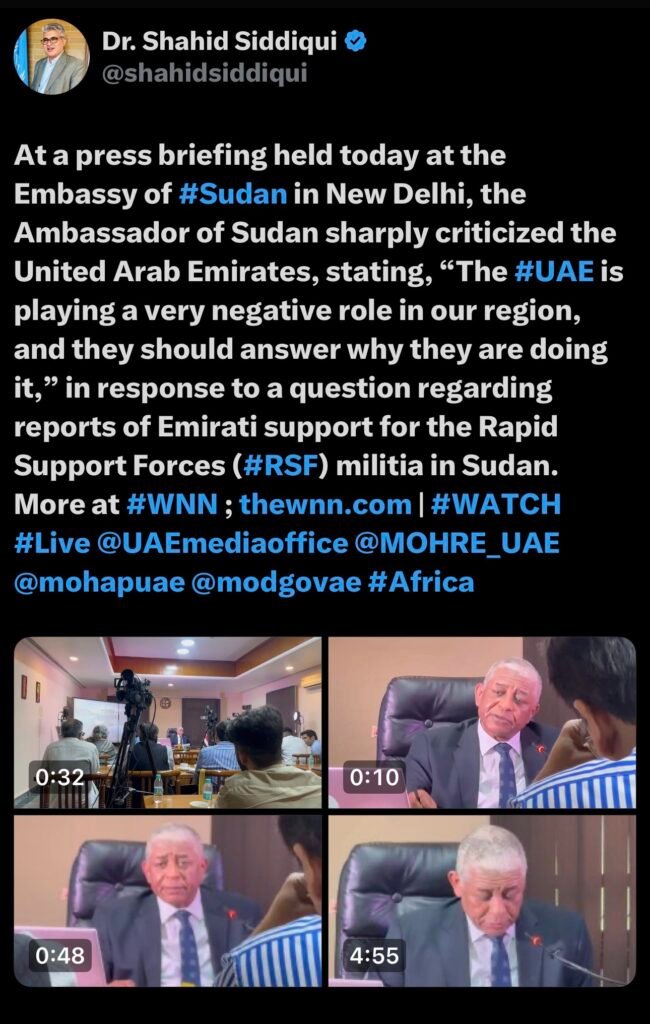NEW DELHI: Sudan’s Ambassador to India, Dr. Mohammed Abdalla Ali Eltom, has forcefully rejected the international narrative describing Sudan’s ongoing turmoil as a “civil war,” asserting instead that his country is under attack from non-regional actors using the Rapid Support Forces (RSF) as proxies. Speaking at a press conference in New Delhi, Ambassador Eltom accused the United Arab Emirates (UAE) of supplying weapons to the RSF, which has carried out brutal assaults against civilians in El Fashir, the capital of North Darfur.
“Sudan is not facing a civil war. We are confronting conspiracies of non-regional actors. The RSF is acting as a proxy for foreign powers, and a few countries in the region are acting as corridors for arms supply to the RSF,” said Ambassador Eltom, making one of the most direct allegations yet against a Gulf power involved in the conflict.
The envoy claimed that UAE-supplied weapons are being funneled through Libya and Chad, enabling the RSF militia to launch devastating offensives across Sudanese cities. “Stopping the supply of weapons by the UAE to the RSF will be the first step in ending the war,” he stated, calling for a unified and firm global response.
Ambassador Eltom warned that the RSF’s operations go far beyond Sudan’s borders, posing a grave threat to regional stability. “The militia threatens to destabilize the entire region from the Red Sea to Central Africa. Therefore, the international community must designate the RSF as a terrorist organization and impose targeted sanctions on them and all weapons suppliers that are supporting them,” he said.
He further noted that the RSF’s use of advanced “strategic drones” capable of long-duration flights is clear evidence of state-level military backing. Citing reports from UN Under Secretary-General for Humanitarian Affairs Tom Fletcher, Eltom highlighted that RSF’s recent attacks in El Fashir resulted in “mass executions and deliberate starvation” of civilians.
Despite the ferocity of the fighting, Eltom emphasized that the Sudanese Armed Forces (SAF) continue to control nearly 80% of the country’s territory. He expressed confidence that RSF’s advances could be rolled back if the international community imposes strict sanctions on its backers and cuts off its supply chains.
Expressing gratitude to India, Dr. Eltom lauded New Delhi’s consistent humanitarian support amid Sudan’s ongoing crisis. He noted that India has provided medical aid and food supplies and that its embassy continues to operate, having been relocated from war-torn Khartoum to Port Sudan in May 2023 to ensure uninterrupted diplomatic and relief efforts.
“Our relations with India are long-standing and deeply rooted. India has always been an important partner to Sudan, in times of peace and in times of war. During this ongoing crisis, India has extended humanitarian assistance to Sudan and continues to do so,” said Ambassador Eltom, adding that Sudan has briefed Indian officials on recent developments and believes India could play a constructive role in the country’s reconstruction and peacebuilding process.
The envoy also confirmed that an Indian national has been captured by RSF militants in El Fashir after the militia stormed the city on October 26. “There is a communication blackout in El Fashir, so we do not know much about him, though we have the video of the Indian national. We are in contact with the Ministry of External Affairs, and we hope we can get him back soon,” he said, noting that “India can make a difference as it is a powerful actor.”
Ambassador Eltom’s remarks signal a significant shift in Sudan’s diplomatic posture, seeking to reframe the global understanding of the conflict from a domestic power struggle to a full-fledged proxy war driven by external interference. His accusation against the UAE introduces a new dimension to the Red Sea’s volatile security landscape, already strained by rival Gulf and African power interests.
By calling for international sanctions on RSF and its suppliers, Eltom is urging the world to look beyond Khartoum’s internal politics and recognize the deeper geopolitical contest shaping the crisis, one that could redraw security alignments across Africa and the Middle East. As the humanitarian toll worsens and attention remains fragmented, Sudan’s appeal to India and the broader Global South underscores an emerging reality: the battle for Sudan is not just about territory, but about sovereignty, influence, and the future balance of power across the Red Sea corridor.
– Dr. Shahid Siddiqui | Follow on X @shahidsiddiqui




















